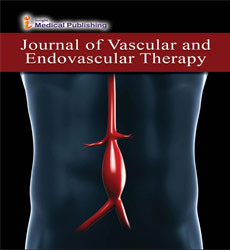Action on Opioids in Vascular Study
Frank Kork
DOI10.36648/2634-7156.21.6.31
Frank Kork*
Department of Vascular Surgery, Harvard University, USA
- *Corresponding Author:
- Frank Kork
Department of Vascular Surgery, Harvard University, USA
E-mail: korf@med.umich.edu
Received Date: July 19, 2021; Accepted Date: July 23, 2021; Published Date: July 30, 2021
Citation: Kork F (2021) Action on Opioids in Vascular Study. J Vasc Endovasc Therapy Vol.6 No.7: 31.
The opioid scourge has made expanding (and late) investigation of perioperative agony the executives. A developing collection of proof involves elective methods performed on opioid guileless patients as an entryway to reliance, at times with lethal results. Unused pills from topped remedies frequently wind off in the possession of individuals other than the patient for whom they were endorsed, growing the risk of over-recommending to a circle of individuals encompassing or downstream from the planned beneficiary. New, opioid free ways to deal with perioperative agony the board have emerged to keep away from opioid solutions whenever the situation allows. Local area projects to reclaim unused meds, a significant number of which are specialist started, are likewise assisting with keeping pills out of the hands of individuals who may acquire torment medication without a remedy through robbery or illicit resale. State and neighborhood governments are participating in the battle against the opioid emergency through suit against makers, expanded administrative oversight (counting remedy limits with punishments for suppliers), and projects to help distinguishing proof and salvage from gluts. Patients with vascular infection incorporate a wide range of findings, anatomic illness appropriations, and methodology. Some vascular methods have clear equals to outpatient surgeries in different strengths, where drives to diminish opioid endorsing, including improved recuperation after medical procedure, have been carried out and in this manner demonstrated fruitful. Models incorporate endocrine and laparoscopic medical procedure, where the activities are normally performed on an outpatient premise and the patient is regularly expected to make a total recuperation with potential for fix. Maybe than rehashing an already solved problem, vascular experts should think about adjusting programs from different strengths that have demonstrated powerful for lessening opioid use, subsequently saving themselves from gaining from similar errors recently made by others. Seriously testing, notwithstanding, are situations where patients present with constant agony brought about by on going illness measures, and long haul the board, instead of fix, is required. Numerous vascular experts meet these patients under conditions that are testing regardless of the opioid issue, regularly after different treatment mediations have fizzled over the long run. Instances of patients who may fall into this classification incorporate those with rest torment from on going appendage undermining ischemia or Buerger's infection. In contrast to other elective strategies, where the aggravation is principally system related and expected to determine with time, these patients require a drawn out aggravation the board procedure, where the timetable is indistinct and may keep going for the remainder of the patient's life. Vascular experts should be open to starting a discussion with these patients about torment drug and proactive in conveying the arrangement to different individuals from the patient's consideration group (counting essential consideration doctors and torment trained professionals, both of whom are progressively overpowered by the quantity of patients requiring persistent agony the executives and the expanded administrative oversight). Since vascular experts may not consider patients to be consistently as their essential consideration doctors, it is significant for all gatherings to know about the torment the executives technique, including what medicines have been given and assumptions about who will give tops off. Hesitance to treat torment because of worries about hazard of excess, responsibility, or administrative oversight should be adjusted against the individual necessities of patients with persistent torment, so these patients are not deserted. In this issue of Vascular Medicine, the examination by Colton and associates gives a significant initial move toward more intelligent agony the executives through smart and particular opioid use in patients with vascular infection, with a basic glance at recommending designs. Tops off were only sometimes required, and patients showing that they had a larger number of pills than needed dwarfed the individuals who revealed getting short of what they required by more than double. These discoveries propose that limitation and decrease are suitable for most of patients, and that vascular experts are adding to the pool of abundance opiate pills that keeps on negatively affecting our patients, families, and networks. Vascular experts need to take part in diminishing the fluctuation in opioid recommending designs through organized methodologies, for example, the departmental rules created and carried out by Colton and partners at the University of Vermont because of their investigation results. Further advances ought to incorporate organized schooling and preparing for vascular suppliers and learners on proper recommending rehearses, group based techniques for patients with on going agony who require a medical procedure, and forthright correspondence with patients and families about torment the executives (counting opioids) when any method is planned.
Open Access Journals
- Aquaculture & Veterinary Science
- Chemistry & Chemical Sciences
- Clinical Sciences
- Engineering
- General Science
- Genetics & Molecular Biology
- Health Care & Nursing
- Immunology & Microbiology
- Materials Science
- Mathematics & Physics
- Medical Sciences
- Neurology & Psychiatry
- Oncology & Cancer Science
- Pharmaceutical Sciences
